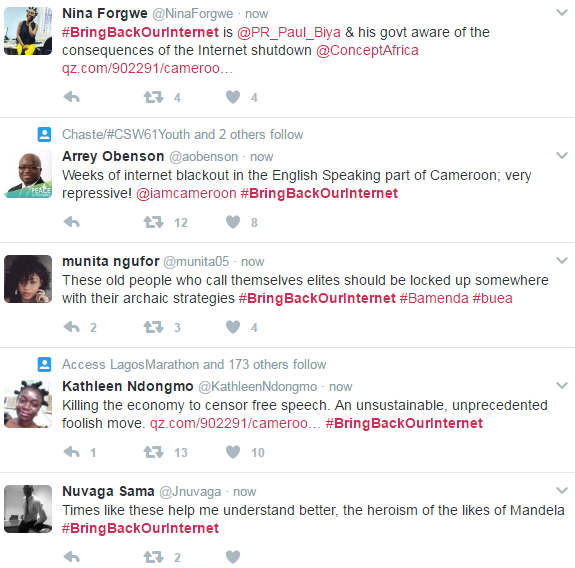#BringBackOurInternet protests ongoing after Cameroon’s government shutdown Internet connection in English-speaking parts of the country

Protests have been going on in Anglophone parts of Cameroon after the government shut down internet connections earlier this year.
On January 18th 2017, authorities ordered the country’s telecommunications providers to shut off internet connections to the regions of Northwest and Southwest – the English speaking parts of the country.
According to Aljazeera:
The internet blackout came after the government outlawed at least two Anglophone groups – Southern Cameroons National Council and the Cameroon Anglophone Civil Society Consortium – and arrested some of their leaders.Using the hashtag #BringBackOurInternet, protesters are prevailing on the Paul Biya led government to restore access to internet.
The groups had been pushing for so-called Ghost Town actions, in which they urge members of the public to stay at home and shops and businesses to shut.
The aim is to peacefully protest against what activists call the marginalisation of the English-speaking regions by government imposing the French language on their schools and courts.
Areas controlled by Britain and France joined to form Cameroon after the colonial powers withdrew in the 1960s.
As a result, the country now has 10 semi-autonomous administrative regions; eight are Francophone, while the Northwest and Southwest regions are home to approximately five million English-speakers.
Anglophones in the country have long complained that they face discrimination, saying that they are excluded from state jobs as a result of their limited French language skills.
They also complain that official documents are often only published in French, even though English is also an official language.
There are issues in the judicial sector as well.
The country’s legal system is largely based on French civil law, but English-speaking regions still operate under the English common law.
Cameroonian lawyers say that the government is sending French-educated civil law judges who do not understand English common law to their courts.
Anglophone Cameroonians believe that only a complete overhaul of the administrative departments in the country and an inclusive federal constitution can end their woes.
Cameroon had adopted a federal government system in the 1960s but this system was later dropped after a referendum.




Comments